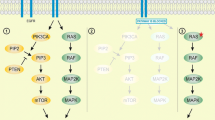Abstract
Aim
We initiated this study in order to analyze whether the expression level of targeted receptor tyrosine kinases (RTK) is associated with the K-ras mutation status.
Methods
The expression pattern of VEGFR1, VEGFR2, VEGFR3, PDGFRα, PDGFRβ, and EGFR1 was analyzed in 93 samples of human colorectal carcinoma samples and correlated with the K-ras mutation status as identified by PCR-RFLP.
Results
VEGFR1, VEGFR2, VEGFR3, PDGFRα, PDGFRβ, and EGFR1 were expressed at relevant levels in 95%, 46%, 46%, 85%, 62%, and 82%, respectively. K-ras mutations were present in 53% (codon 12, 47%; codon 13, 6%). Expression of VEGFR1 (P = 0.0263), VEGFR2 (P = 0.0466), and PDGFRα (P = 0.0063) was significantly linked to K-ras codon 12 or 13 mutation. In addition, co-expression of VEGFR2 and PDGFRα was significantly associated with K-ras mutation (P = 0.0145).
Conclusion
Our data reveal that specific RTKs are over-expressed in K-ras mutated cancers. It needs to be addressed in prospective studies whether these patients will benefit from tyrosine kinase inhibitors more than K-ras wild-type.
Similar content being viewed by others
References
Greenlee RT, Murray T, Bolden S, Wingo PA (2000) Cancer statistics, 2000. CA Cancer J Clin 50:7–33
Weir HK, Thun MJ, Hankey BF et al (2003) Annual report to the nation on the status of cancer, 1975–2000, featuring the uses of surveillance data for cancer prevention and control. J Natl Cancer Inst 95:1276–1299
August DA, Ottow RT, Sugarbaker PH (1984) Clinical perspective of human colorectal cancer metastasis. Cancer Metastasis Rev 3:303–324
Fearon ER, Vogelstein B (1990) A genetic model for colorectal tumorigenesis. Cell 61:759–767
Cho KR, Vogelstein B (1992) Suppressor gene alterations in the colorectal adenoma–carcinoma sequence. J Cell Biochem Suppl 16G:137–141
Vogelstein B, Kinzler KW (1993) The multistep nature of cancer. Trends Genet 9:138–141
Smith G, Carey FA, Beattie J et al (2002) Mutations in APC, Kirsten-ras, and p53-alternative genetic pathways to colorectal cancer. Proc Natl Acad Sci U S A 99:9433–9438
Li E, Hristova K (2006) Role of receptor tyrosine kinase transmembrane domains in cell signaling and human pathologies. Biochemistry 45:6241–6251
Mobius C, Stein HJ, Becker I et al (2003) The “angiogenic switch” in the progression from Barrett's metaplasia to esophageal adenocarcinoma. Eur J Surg Oncol 29:890–894
Liu XE, Sun XD, Wu JM (2004) Expression and significance of VEGF-C and FLT-4 in gastric cancer. World J Gastroenterol 10:352–355
Yonemura Y, Endo Y, Tabata K et al (2005) Role of VEGF-C and VEGF-D in lymphangiogenesis in gastric cancer. Int J Clin Oncol 10:318–327
Takahashi Y, Cleary KR, Mai M, Kitadai Y, Bucana CD, Ellis LM (1996) Significance of vessel count and vascular endothelial growth factor and its receptor (KDR) in intestinal-type gastric cancer. Clin Cancer Res 2:1679–1684
Tokunaga A, Onda M, Okuda T et al (1995) Clinical significance of epidermal growth factor (EGF), EGF receptor, and c-erbB-2 in human gastric cancer. Cancer 75:1418–1425
Wang KL, Wu TT, Choi IS et al (2007) Expression of epidermal growth factor receptor in esophageal and esophagogastric junction adenocarcinomas: association with poor outcome. Cancer 109:658–667
Drescher D, Moehler M, Gockel I et al (2007) Coexpression of receptor-tyrosine-kinases in gastric adenocarcinoma—a rationale for a molecular targeting strategy? World J Gastroenterol 13:3605–3609
Schimanski CC, Linnemann U, Berger MR (1999) Sensitive detection of K-ras mutations augments diagnosis of colorectal cancer metastases in the liver. Cancer Res 59:5169–5175
Argraves WS, Drake CJ (2005) Genes critical to vasculogenesis as defined by systematic analysis of vascular defects in knockout mice. Anat Rec A Discov Mol Cell Evol Biol 286:875–884
Stadler WM (2005) Targeted agents for the treatment of advanced renal cell carcinoma. Cancer 104:2323–2333
An P, Lei H, Zhang J et al (2004) Suppression of tumor growth and metastasis by a VEGFR-1 antagonizing peptide identified from a phage display library. Int J Cancer 111:165–173
Hanrahan V, Currie MJ, Gunningham SP et al (2003) The angiogenic switch for vascular endothelial growth factor (VEGF)-A, VEGF-B, VEGF-C, and VEGF-D in the adenoma–carcinoma sequence during colorectal cancer progression. J Pathol 200:183–194
Simiantonaki N, Taxeidis M, Jayasinghe C, Kirkpatrick CJ (2007) Epithelial expression of VEGF receptors in colorectal carcinomas and their relationship to metastatic status. Anticancer Res 27:3245–3250
Witte D, Thomas A, Ali N, Carlson N, Younes M (2002) Expression of the vascular endothelial growth factor receptor-3 (VEGFR-3) and its ligand VEGF-C in human colorectal adenocarcinoma. Anticancer Res 22:1463–1466
Wehler TC, Frerichs K, Graf C et al (2008) PDGFRalpha/beta expression correlates with the metastatic behavior of human colorectal cancer: a possible rationale for a molecular targeting strategy. Oncol Rep 19:697–704
Spano JP, Lagorce C, Atlan D et al (2005) Impact of EGFR expression on colorectal cancer patient prognosis and survival. Ann Oncol 16:102–108
Gamboa-Dominguez A, Dominguez-Fonseca C, Quintanilla-Martinez L et al (2004) Epidermal growth factor receptor expression correlates with poor survival in gastric adenocarcinoma from Mexican patients: a multivariate analysis using a standardized immunohistochemical detection system. Mod Pathol 17:579–587
Kopp R, Rothbauer E, Ruge M et al (2003) Clinical implications of the EGF receptor/ligand system for tumor progression and survival in gastrointestinal carcinomas: evidence for new therapeutic options. Recent Results Cancer Res 162:115–132
Linnemann U, Schimanski CC, Gebhardt C, Berger MR (2004) Prognostic value of disseminated colorectal tumor cells in the liver: results of follow-up examinations. Int J Colorectal Dis 19:380–386
Author information
Authors and Affiliations
Corresponding author
Rights and permissions
About this article
Cite this article
Schimanski, C.C., Zimmermann, T., Schmidtmann, I. et al. K-ras mutation status correlates with the expression of VEGFR1, VEGFR2, and PDGFRα in colorectal cancer. Int J Colorectal Dis 25, 181–186 (2010). https://doi.org/10.1007/s00384-009-0843-7
Accepted:
Published:
Issue Date:
DOI: https://doi.org/10.1007/s00384-009-0843-7




